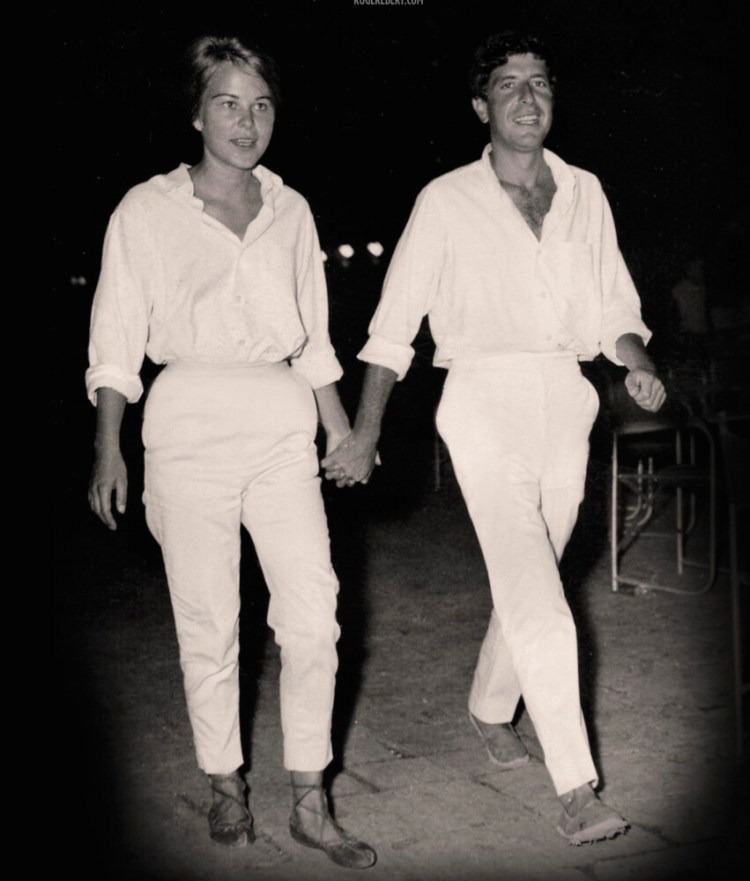We start at the beginning of that wonderful, terrifying, joyous, candy-colored acid and weed fueled decade that brought us a kaleidoscope of gifted, talented faces. Among the brilliant sounds were the The Mamas and the Papas, The Beatles, The Grateful Dead, Rolling Stones and all the sounds out of Hollywood’s fabled Laurel Canyon.

But on the other side of the world, one of the artists who would emerge with a single, soulful sound was Canada’s Leonard Cohen.
Filmmaker Nick Broomfield’s romantic, lovely, soft toned and melancholy “Marianne & Leonard: Words of Love” brings us a documentary poem of a fragile love affair between Cohen, a failed novelist, who would rise out of the ashes of defeat to become one of the decade’s great songwriter performers, and his Nordic goddess.
The story begins on the Greek island of Hydra when Cohen, depressed by the stunning trashing of his latest novel “Beautiful Losers,” is searching for his place in the literary sun.
Then on one beach day, he runs headlong into Norwegian Marianne Ihlen, running away, with small son in tow, from an abusive relationship back home.
Cohen, a romanticist, in and out of love affairs, was electrified by the golden haired, pouty lipped woman who, with damaged heart, was searching for a new life.
Here, on this iconic Greek landscape, expatriates from all over world found a sun-drenched paradise, a garden of Eden, where drugs of all kinds and free sex were as readily available as the snake’s apple offered to Eve.
The dark-haired, pensive Jewish boy from a wealthy Canadian family and the gorgeous princess from Norway fell into each other’s arms and dreams.
Cohen appointed her his “muse,” and over the first couple of years, drifted from Montreal’s snow back to Hydra, where she refueled his passion for her.
On Hydra, Cohen, numbed by drugs and weary of searching, sought solace in the warm embrace of this different sun.
But over time, the heat of passion and soft warmth of companionship diminished.
Both had lovers along the way, but always came sliding back to one another for a drink of soul water. This went on for decades, until 2016 when both died, three months apart.
In the neon and smoky decade of the ’60s and ’70s, Leonard connected with the famous Judy Collins, who saw something usable.
Collins, lover and mother image to him, kept prodding him to turn to music. When this time, he picked up a guitar, the spark that had always been there ignited, and Leonard Cohen, mournful balladeer and sentimental songster emerged.
There were more trysts with Marianne and an affair with the tempestuous Janis Joplin.
Leonard’s life took a serious turn when in pursuit of spiritual truth, he took comfort by retiring to the Mt. Baldy Zen Center in L.A. Here, he was ordained as a monk in 1996.
After years of soaking in Zen Buddhism, Leonard Cohen, of “Suzanne” and “Hallelujah,” appeared on stage in Canada, where he was given a three-minute standing ovation even before he opened his mouth.
The end of it all began when his manager Kelly Lynch defrauded him of more than $5 million dollars, leaving him broke.
Unfazed, he went on to “grand tours,” and performed 387 shows before his final appearance in 2013 in Paris, where Marianne, now heavier and older, but with the same eyes that had seduced Leonard on Hydra so many years before, sat with her new husband in the front row.
Fans and music historians are fond of calling their fractured and re-glued romance the “greatest love story of all time.”
After watching this film twice, I would have to disagree. They were lovers, yes, but both had many others.
The film ends with an aging and sick Marianne Ihlen dying of leukemia in a Norwegian hospital. When Leonard was notified of her condition, he sent her a last letter, actually an email, immediately.
We watch her last moments filmed by a friend, as the letter is read to her. It begins: “Well, Marianne, it’s come to this time when we are really so old and our bodies are falling apart, and I think I will follow you very soon. Know that I am so close behind you that if you stretch out your hand, I think you can reach mine.”
There is another paragraph, a last cri de coeur, but you must hear it, and watch the scene wherein she lifts one hand and seems to conduct the words as if they were musical notes. Leonard, broken in body but strong in spirit, died three months later.
That final moments in this splendid and lovely constructed film, will, of course, break the hardest heart, and is for you to embrace.
J.P. Devine, of Waterville, is a former stage and screen actor.
Copy the Story LinkSend questions/comments to the editors.



Success. Please wait for the page to reload. If the page does not reload within 5 seconds, please refresh the page.
Enter your email and password to access comments.
Hi, to comment on stories you must . This profile is in addition to your subscription and website login.
Already have a commenting profile? .
Invalid username/password.
Please check your email to confirm and complete your registration.
Only subscribers are eligible to post comments. Please subscribe or login first for digital access. Here’s why.
Use the form below to reset your password. When you've submitted your account email, we will send an email with a reset code.